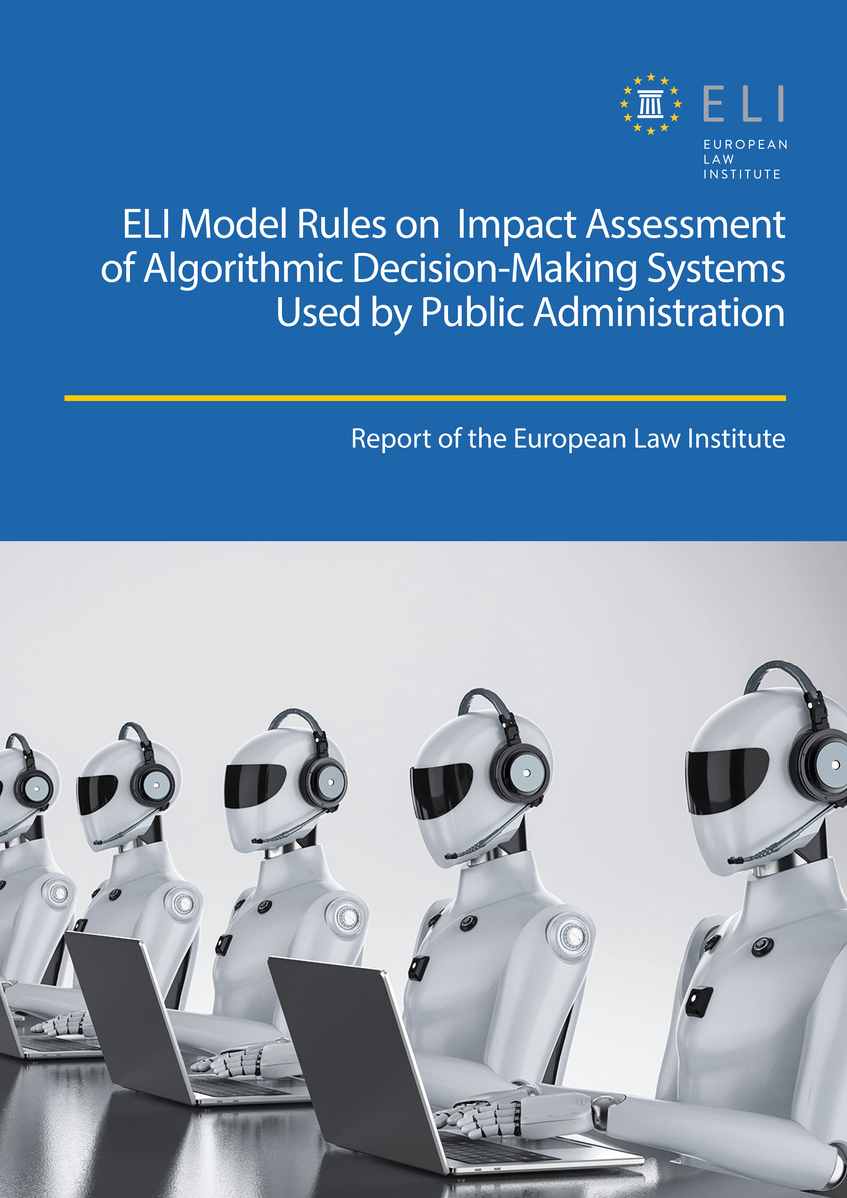ELI Model Rules on Impact Assessment of Algorithmic Decision-Making Systems Used by Public Administration
Quick Facts
Project Type: Model Rules
Procedure: Regular
Adopted: CD 2020/12 on a Project
Project Period: May 2020–February 2022
Events
An overview of past and upcoming events of this project is available here.
Translations
An overview of translations of this project is available here.
Summary
The Project Team sought to lay down Model Rules to supplement European legislation on AI in the specific context of public administration that would not hinder innovation but would provide solid safeguards to improve citizens’ confidence in the use of the technology in this field. They do so by promoting the use of impact assessments.
Background
As an emanation of the State's public functions, public administration entails the processing of much more data than most private entities. New technologies, such as AI, can therefore play a significant role in the modernisation and overall improvement of the functioning of public administration. At the same time, however, a guarantee of the transparency, correctness and security of the processed data is also fundamental. Therefore, the possibility of implementing AI in the operation of public administration is limited by the principle of legality and the need to ensure a high degree of reliability of technologies used, as well as the need to ensure respect for citizens’ rights.
Public administration is, as a result, confronted with specific challenges in the deployment of AI and, more generally, algorithmic decision-making systems (ADMSs), even if they do not use specific AI technologies, such as machine learning. The use of these techniques poses specific problems relating to the principle of good administration. In addition, issues such as transparency, accountability, compliance and non-discrimination are particularly relevant in the context of public administration.
Aim
The Project Team sought to lay down Model Rules to supplement European legislation on AI in the specific context of public administration that would not hinder innovation but would provide solid safeguards to improve citizens’ confidence in the use of the technology in this field. They do so by promoting the use of impact assessments.
Outcome
The project led to the development of the ELI Model Rules on Impact Assessment of Algorithmic Decision-Making Systems Used by Public Administration. While inspired to some extent by EU law, and compatible not only with existing EU law, but also with the law currently being drafted, the ELI Model Rules were designed so as not to be dependent on EU law. As such they could serve as inspiration to national (including non-EU) and EU legislators, to governments and administrations.
There are various ways in which concerns raised by algorithmic decision-making can be addressed. The central idea underlying the Model Rules is an Impact Assessment. As the variety of situations in which algorithmic decision-making is employed precludes a one-size fits all approach, the Model Rules adopt an approach, distinguishing high-risk systems warranting an Impact Assessment (Annex 1), low risk systems (Annex 2) which do not, and systems that cannot readily be classified ex ante as falling within either Annex 1 or Annex 2. An Impact Assessment is required in the latter case if a risk evaluation (screening procedure) reveals that the system constitutes at least a substantial risk.
The output consists of 16 articles which include the Impact Assessment procedure and provide for additional safeguards for high-risk systems, such as scrutiny of the Impact Assessment by an expert board, as well as the opportunity for public participation.
Chair
- Marek Wierzbowski
Project Reporters
- Marc Clément
- Paul Craig
- Jens-Peter Schneider
Project Team Members
- Jonathan Dollinger
- Franz Merli
- Daniel Le Métayer
- Karolina Wojciechowska
- Katarzyna Ziółkowska
Advisory Committee Members
- Fabrizio Cafaggi
- Raja Chatila
- Peter Darak
- Jonas Ebbesson
- Joanna Goodey
- Michael Gøtze
- Alexia Maniaki-Griva
- William M McKechnie
- Yannick Meneceur
- Philip Moser (Assessor)
- Pascal Pichonnaz (Assessor)
- Ilaria Pretelli (Assessor)
- David Reichel
- Jane Reichel
- Jason M Schultz
- Olivia Tambou
- Clara Velasco
- Fryderyk Zoll (Assessor)
Members Consultative Committee
Raquel Abajas
- Chiara Angiolini
- Francesco Avolio
- Arvind Babajee
- Alexander Balthasar
- Robert Bray
- Alessandro Cenerelli
- Ignace Claeys
- Council of the Notariats of the European Union (represented by Tamás Parti, Raul Radoi and Tamás Sajben)
- Edita Čulinović Herc
- Alberto De Franceschi
- Gudula Deipenbrock
- Darinka Dekleva Marguč
- Mustafa Ebaid
- Wian Erlank
- Sjef van Erp
- Dessislava Fessenko
- Elena Mihaela Fodor
- Laurence Gormley
- Patrícia Guimarães
- Sarah Houllier
- Dariusz Kloza
- Maria Lubomira Kubica
- Stephanie Laulhe Shaelou
- Dulce Lopes
- Elwira Macierzyńska-Franaszczyk
- Caroline Mantl
- Carlos Marinho
- Irena Nesterova
- Elena Alina Ontanu
- Manuel Peláez Muras
- Katarzyna Pokryszka
- Radim Polčák
- Oreste Pollicino
- Francesco Quarta
- Teresa Rodriguez de las Heras Ballell
- Leigh Sagar
- David Michael Schneeberger
- Anna Simonati
- Guillem Soler Solé
- Henrique Sousa Antunes
- Veronica Williams
- Boštjan Zalar

